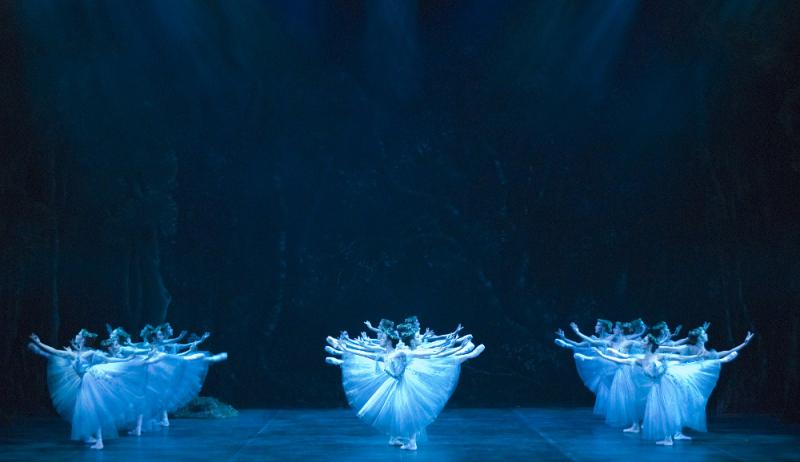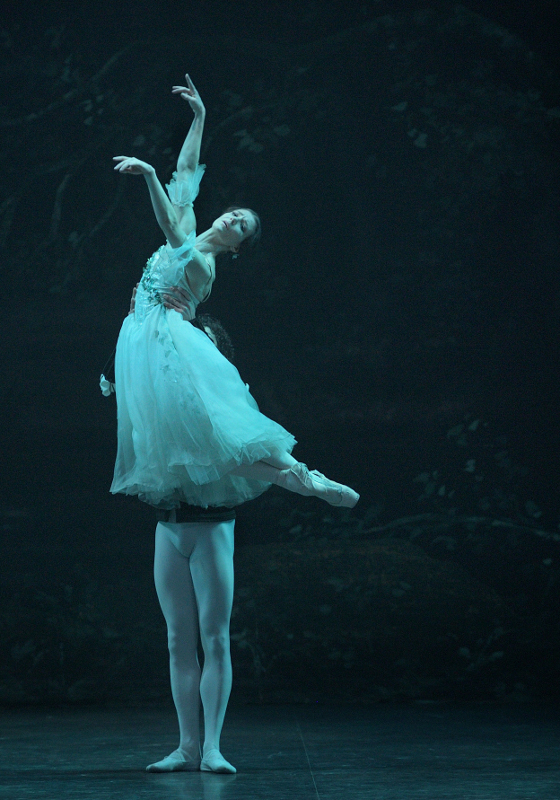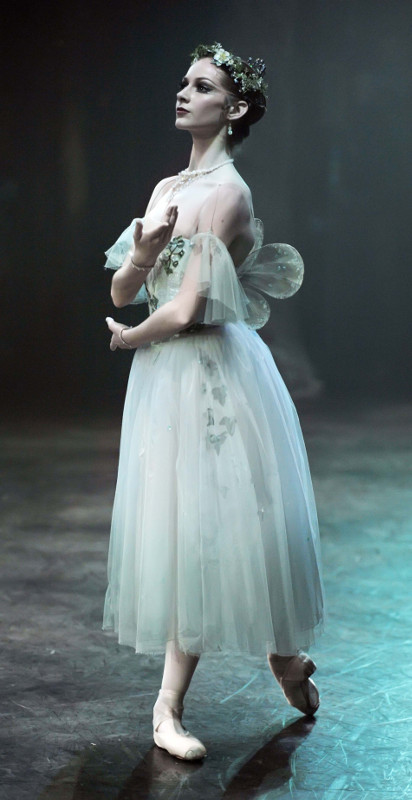Giselle, English National Ballet, London Coliseum | reviews, news & interviews
Giselle, English National Ballet, London Coliseum
Giselle, English National Ballet, London Coliseum
Cojocaru and Hernández delicious in perfect heritage production

In the annals of ballet directors, always searching for the perfect balance between heritage programming and new work, there can rarely have been a double whammy so successful.
For the true ballet fan, Skeaping's Giselle takes the crown: it is as fine a vehicle as ever a ballet company had for making a good impression, and the current crop of dancers and ballet masters at ENB are more than capable of doing justice to it. I see two or three Giselles a year, but I can't remember the last time I saw such exquisite Wilis. The corps dancers have been coached to perfection in the Romantic style of downcast eyes and softly curved arms: standing stock-still, they give the impression of imminent movement, like birch branches poised to tremble in the wind, while moving they flit and rustle like storm-tossed leaves. In clouds of greeny-white tulle, they look more elegant and more demure than the ragged spectres of John Macfarlane's eerie designs for the Royal Ballet. Skeaping's production is not necessarily less scary than others, but it conveys terror through beauty: the implacability of the Wilis is all the creepier when they are so soft and sylph-like.
 Alina Cojocaru as Giselle certainly eschews the febrile and histrionic. Playing the character as the sweetest, shyest, most sheltered girl child, she gives no hint of a predilection to madness or a weak heart: hers is the devastatingly simple and obvious vulnerability of tender youth. Her shyness as she is wooed by Albrecht – covering her face in embarrassment, drawing back startled from the suggestion of a kiss – inflects her dancing as well. Though she is as brilliant a prima ballerina as one could wish to see, her show-offery throughout is of a quiet sort, and always pressed into service of the character. For instance, she executes the famous hops on pointe, inserted as a show-off solo and usually performed as such, hesitantly and almost awkwardly, like a Victorian child stumbling over words when called to recite its party piece in front of company – even if this was a choice forced by injury, she pulls it off as if it was dramtically deliberate. In Act II, she dances the Wili Giselle in the masterfully understated Bournonville style she has perfected through long professional and personal partnership with Johann Kobborg. It's heart-stopping stuff: her progress from floor to flight in the sylph-like lifts (pictured above right) creates the perfect illusion of gossamer lightness, so that she really seems to drift away from the ground like a petal on a breeze.
Alina Cojocaru as Giselle certainly eschews the febrile and histrionic. Playing the character as the sweetest, shyest, most sheltered girl child, she gives no hint of a predilection to madness or a weak heart: hers is the devastatingly simple and obvious vulnerability of tender youth. Her shyness as she is wooed by Albrecht – covering her face in embarrassment, drawing back startled from the suggestion of a kiss – inflects her dancing as well. Though she is as brilliant a prima ballerina as one could wish to see, her show-offery throughout is of a quiet sort, and always pressed into service of the character. For instance, she executes the famous hops on pointe, inserted as a show-off solo and usually performed as such, hesitantly and almost awkwardly, like a Victorian child stumbling over words when called to recite its party piece in front of company – even if this was a choice forced by injury, she pulls it off as if it was dramtically deliberate. In Act II, she dances the Wili Giselle in the masterfully understated Bournonville style she has perfected through long professional and personal partnership with Johann Kobborg. It's heart-stopping stuff: her progress from floor to flight in the sylph-like lifts (pictured above right) creates the perfect illusion of gossamer lightness, so that she really seems to drift away from the ground like a petal on a breeze.
 In all things she is ably supported by her Albrecht, fresh-faced Mexican Principal Isaac Hernández, who fully matches Cojocaru for soul and passion (pictured left: Hernández and Cojocaru). In a nice bit of characterisation he gives us Duke Albrecht as heedless boy romantic; no hint here of the calculating aristocratic philanderer with droit de seigneur in mind, just a lad whose exuberance (see the size of those jumps!) causes him to go too far with an impossible fantasy. He seems to be genuinely in love with Giselle, and genuinely stricken by the fatal consequence of his seduction. It's no surprise that the love of these two survives death: such radiant tenderness as we see between them in Act I makes Giselle's defence of him entirely believable.
In all things she is ably supported by her Albrecht, fresh-faced Mexican Principal Isaac Hernández, who fully matches Cojocaru for soul and passion (pictured left: Hernández and Cojocaru). In a nice bit of characterisation he gives us Duke Albrecht as heedless boy romantic; no hint here of the calculating aristocratic philanderer with droit de seigneur in mind, just a lad whose exuberance (see the size of those jumps!) causes him to go too far with an impossible fantasy. He seems to be genuinely in love with Giselle, and genuinely stricken by the fatal consequence of his seduction. It's no surprise that the love of these two survives death: such radiant tenderness as we see between them in Act I makes Giselle's defence of him entirely believable.
In general, this is a production, and a performance, which embraces slowness and makes a virtue of restraint. Everything is given space to breathe, from Cojocaru's tentative hooking of her arm through Hernández's, to their almost langurous pas de deux in Act II – the latter stretching the concept of adagio almost to breaking point, it must be said. The dawn parting between the exhausted Albrecht and Giselle's spirit is much longer than in other productions and more emotional: so strongly has longing survived death that we almost believe Giselle will really manage to get those spectral arms around the man she loves and hold on to the day.
 Supporting characters are good all round: Fernando Bufalá plays Hilarion with stolid decency and a hint of hot temper that can nonetheless barely penetrate the love-fog around Giselle and Albrecht. Lauretta Summerscales (pictured right), though a lovely dancer, needs more restraint to make a truly good Myrthe: her natural lyricism and passion bring a little too much Titania to her variation at the beginning of Act II. Lovely Stina Quagebeur makes meat of a small role as a regal, gracious Bathilde, while César Corales, memorable as the sneaking informer Hilarion in the Khan production, makes a decent job of a difficult solo in the peasant pas de deux.
Supporting characters are good all round: Fernando Bufalá plays Hilarion with stolid decency and a hint of hot temper that can nonetheless barely penetrate the love-fog around Giselle and Albrecht. Lauretta Summerscales (pictured right), though a lovely dancer, needs more restraint to make a truly good Myrthe: her natural lyricism and passion bring a little too much Titania to her variation at the beginning of Act II. Lovely Stina Quagebeur makes meat of a small role as a regal, gracious Bathilde, while César Corales, memorable as the sneaking informer Hilarion in the Khan production, makes a decent job of a difficult solo in the peasant pas de deux.
In its careful drawing of character and place (David Walker's designs feature 3D tree trunks, and a discreet jug sign that suddenly makes sense of why the hunting party should ask Giselle's mother for a drink), its inclusion of passages of music that are normally cut (I loved the short fugue in Act II which sees wave upon wave of Wilis rush at Albrecht and peel off again defeated, harmless as spume in the face of Giselle's protection), and above all its sensitivity to the unearthly beauty of the Wilis' choreography, Skeaping's is a Giselle to treasure forever. And with some very exciting casts scheduled to dance (look out for Tamara Rojo putting Mariinsky star Xander Parish through his paces), this run at the Coliseum is a great treat for London's ballet fans: catch it while you can.
- English National Ballet perform Giselle at the London Coliseum until 22 January
- Read more dance reviews on theartsdesk
rating
Explore topics
Share this article
The future of Arts Journalism
You can stop theartsdesk.com closing!
We urgently need financing to survive. Our fundraising drive has thus far raised £49,000 but we need to reach £100,000 or we will be forced to close. Please contribute here: https://gofund.me/c3f6033d
And if you can forward this information to anyone who might assist, we’d be grateful.

Subscribe to theartsdesk.com
Thank you for continuing to read our work on theartsdesk.com. For unlimited access to every article in its entirety, including our archive of more than 15,000 pieces, we're asking for £5 per month or £40 per year. We feel it's a very good deal, and hope you do too.
To take a subscription now simply click here.
And if you're looking for that extra gift for a friend or family member, why not treat them to a theartsdesk.com gift subscription?
more Dance
 'We are bowled over!' Thank you for your messages of love and support
Much-appreciated words of commendation from readers and the cultural community
'We are bowled over!' Thank you for your messages of love and support
Much-appreciated words of commendation from readers and the cultural community
 How to be a Dancer in 72,000 Easy Lessons, Teaċ Daṁsa review - a riveting account of a life in dance
Michael Keegan-Dolan's unique hybrid of physical theatre and comic monologue
How to be a Dancer in 72,000 Easy Lessons, Teaċ Daṁsa review - a riveting account of a life in dance
Michael Keegan-Dolan's unique hybrid of physical theatre and comic monologue
 A Single Man, Linbury Theatre review - an anatomy of melancholy, with breaks in the clouds
Ed Watson and Jonathan Goddard are extraordinary in Jonathan Watkins' dance theatre adaptation of Isherwood's novel
A Single Man, Linbury Theatre review - an anatomy of melancholy, with breaks in the clouds
Ed Watson and Jonathan Goddard are extraordinary in Jonathan Watkins' dance theatre adaptation of Isherwood's novel
 Peaky Blinders: The Redemption of Thomas Shelby, Rambert, Sadler's Wells review - exciting dancing, if you can see it
Six TV series reduced to 100 minutes' dance time doesn't quite compute
Peaky Blinders: The Redemption of Thomas Shelby, Rambert, Sadler's Wells review - exciting dancing, if you can see it
Six TV series reduced to 100 minutes' dance time doesn't quite compute
 Giselle, National Ballet of Japan review - return of a classic, refreshed and impeccably danced
First visit by Miyako Yoshida's company leaves you wanting more
Giselle, National Ballet of Japan review - return of a classic, refreshed and impeccably danced
First visit by Miyako Yoshida's company leaves you wanting more
 Quadrophenia, Sadler's Wells review - missed opportunity to give new stage life to a Who classic
The brilliant cast need a tighter score and a stronger narrative
Quadrophenia, Sadler's Wells review - missed opportunity to give new stage life to a Who classic
The brilliant cast need a tighter score and a stronger narrative
 The Midnight Bell, Sadler's Wells review - a first reprise for one of Matthew Bourne's most compelling shows to date
The after-hours lives of the sad and lonely are drawn with compassion, originality and skill
The Midnight Bell, Sadler's Wells review - a first reprise for one of Matthew Bourne's most compelling shows to date
The after-hours lives of the sad and lonely are drawn with compassion, originality and skill
 Ballet to Broadway: Wheeldon Works, Royal Ballet review - the impressive range and reach of Christopher Wheeldon's craft
The title says it: as dancemaker, as creative magnet, the man clearly works his socks off
Ballet to Broadway: Wheeldon Works, Royal Ballet review - the impressive range and reach of Christopher Wheeldon's craft
The title says it: as dancemaker, as creative magnet, the man clearly works his socks off
 The Forsythe Programme, English National Ballet review - brains, beauty and bravura
Once again the veteran choreographer and maverick William Forsythe raises ENB's game
The Forsythe Programme, English National Ballet review - brains, beauty and bravura
Once again the veteran choreographer and maverick William Forsythe raises ENB's game
 Sad Book, Hackney Empire review - What we feel, what we show, and the many ways we deal with sadness
A book about navigating grief feeds into unusual and compelling dance theatre
Sad Book, Hackney Empire review - What we feel, what we show, and the many ways we deal with sadness
A book about navigating grief feeds into unusual and compelling dance theatre
 Balanchine: Three Signature Works, Royal Ballet review - exuberant, joyful, exhilarating
A triumphant triple bill
Balanchine: Three Signature Works, Royal Ballet review - exuberant, joyful, exhilarating
A triumphant triple bill
 Romeo and Juliet, Royal Ballet review - Shakespeare without the words, with music to die for
Kenneth MacMillan's first and best-loved masterpiece turns 60
Romeo and Juliet, Royal Ballet review - Shakespeare without the words, with music to die for
Kenneth MacMillan's first and best-loved masterpiece turns 60

Add comment